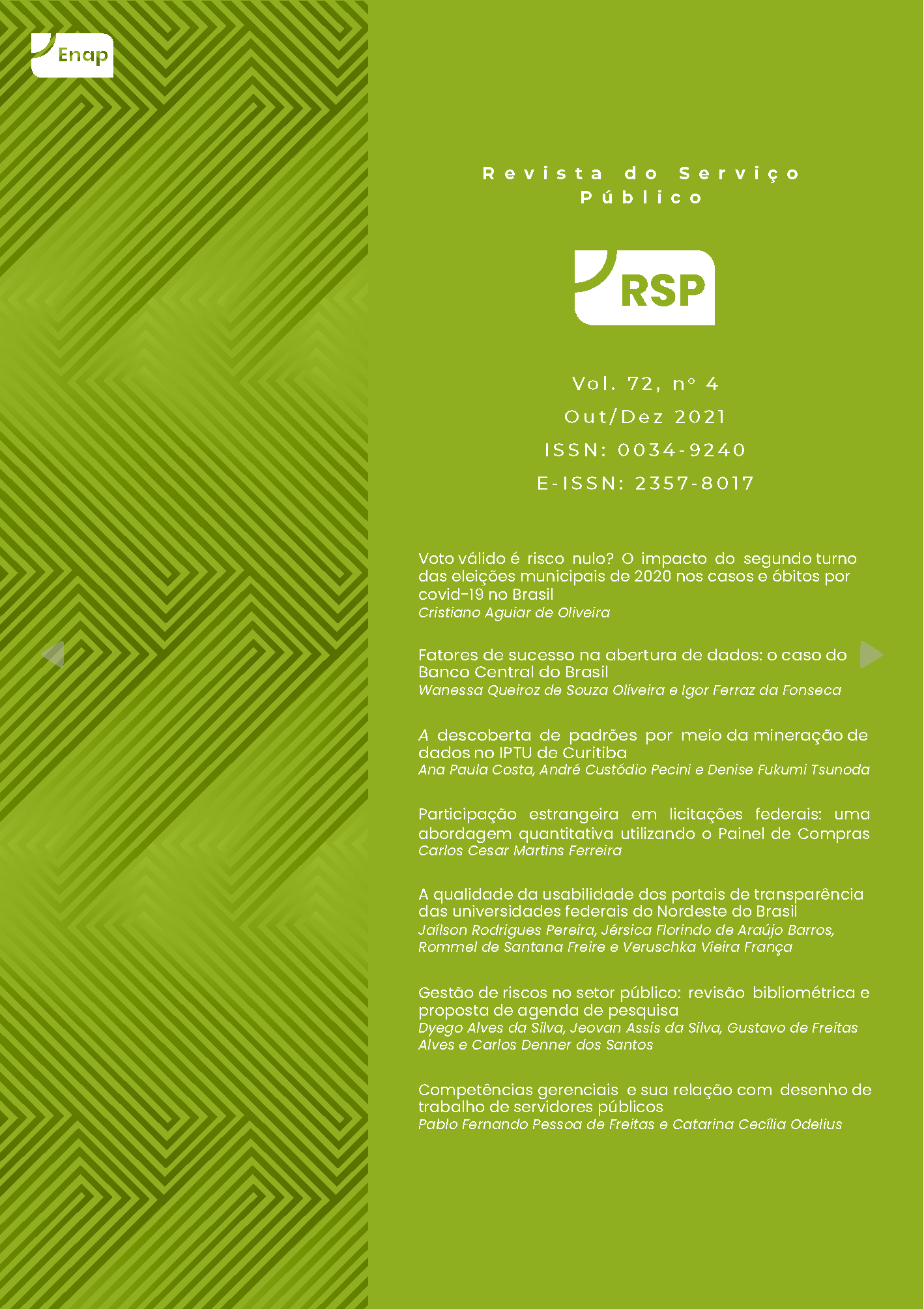Is valid vote free of risk?
The impact of the second-round of 2020 municipal elections on COVID-19 cases and deaths in Brazil
Keywords:
elections, COVID-19, difference in differences, BrazilAbstract
In Brazil, municipalities with more than 200,000 voters are expected to hold a second round of voting whenever no candidate for mayor reaches the majority of valid votes in the first round. Thus, some municipalities that meet this criterion have an electoral campaign extended for at least two more weeks and an additional presence of voters and poll officials at the polling place. This article explores the natural experiment generated by the second-round of the 2020 Brazilian municipal elections to assess the impacts of the electoral process on the spread of COVID-19 in Brazil. To this end, it uses weekly information from recorded cases and deaths from COVID-19 to estimate two-way fixed effects difference in differences models. The results indicate that, in general, despite the worsening of the pandemic in the period studied, the municipalities that held a second-round election did not show an increase in cases and deaths by COVID-19 after the election.
Downloads
References
ANDERSON, R. M.; HEESTERBEEK, H.; KLINKENBERG, D.; HOLLINGSWORTH, T. D. How will country-based mitigation measures influence the course of the covid-19 epidemic? The Lancet, Elsevier, v. 395, n. 10228, p. 931-934, 2020.
ANGRIST, J. D.; PISCHKE, J.-S. Mostly harmless econometrics: an empiricist’s companion. Princeton University Press, 2008.
ASADI, S. et al. Aerosol emission and superemission during human speech increase with voice loudness. Scientific Reports, Nature Publishing Group, v. 9, n. 2348, p. 1-10, 2019.
BERTOLI, S.; GUICHARD, L.; MARCHETTA, F. Turnout in the municipal elections of March 2020 and excess mortality during the covid-19 epidemic in France. SSRN Scholarly Paper, Rochester, NY: Social Science Research Network, 2020.
BERTRAND, M.; DUFLO, E.; MULLAINATHAN, S. How much should we trust differences-in-differences estimates? SSRN Scholarly Paper. Rochester, NY: Social Science Research Network, 2002.
BJØRNSKOV, C. Did lockdown work? An economist’s cross-country comparison. CESifo Economic Studies, v. 67, n. 3, p. 318-331, 2021. Disponível em: <https://doi.org/10.1093/cesifo/ifab003>. Acesso em: 1/4/2021.
BORN, B; DIETRICH, A.; MULLER, G. Do lockdowns work? A counterfactual for Sweden. London: Centre for Economic Policy Research, 2020. https://cepr.org/active/publications/discussion_papers/dp.php?dpno=14744
BOURNE, R. A. Economics in one virus: an introduction to economic reasoning through COVID-19. Washington DC: Cato Institute, 2021.
CASSAN, G.; SANGNIER, M. Liberté, egalité, fraternité… contaminé? Estimating the impact of French municipal elections on COVID-19 spread in France. MedRxiv, Cold Spring Harbor Laboratory Press, p. 2020.06.24.20138990, 2020.
COTTI, C.; et al. The relationship between in-person voting and COVID-19: Evidence from the Wisconsin primary. Contemporary Economic Policy, v. 39, n. 4, p. 760–777, 2021.
DAVE, D. M. et al. When do shelter-in-place orders fight COVID-19 best? Policy heterogeneity across States and adoption time. Working Paper, National Bureau of Economic Research, 2020.
DI PORTO, E.; NATICCHIONI, P.; VINCENZO SCUTINIO, V. Partial lockdown and the spread of COVID-19: lessons from the Italian case. IZA Discussion Papers nº 13375. IZA Institute of Labor Economics, 2020. Disponível em:
<https://www.iza.org/publications/dp/13375/partial-lockdown-and-the-spread-of-covid-19-lessons-from-the-italian-case>. Acesso em: 2/2/2021.
DOWNS, A. An economic theory of democracy. Boston: Prentice Hall, 1957.
FANG, H.; WANG, L.; YANG, Y. Human mobility restrictions and the spread of the Novel Coronavirus (2019-nCoV) in China. Journal of Public Economics, v. 191, [2020?]. No prelo (nº do artigo: 104272).
FELTHAM, E. M. et al. No increase in COVID-19 mortality after the 2020 primary elections in the USA. arXiv preprint, arXiv:2010.02896, 2020. Disponível em: <http://arxiv.org/abs/2010.02896>. Acesso em: 1/4/2021.
FLAXMAN, S. et al. Estimating the effects of non-pharmaceutical interventions on COVID-19 in Europe. Nature, Nature Publishing Group, v. 584, n. 7820, p. 257-261, 2020.
FONG M.W. et al. Nonpharmaceutical measures for pandemic influenza in nonhealthcare settings-social distancing measures. Emerging Infectious Diseases, v. 26, n. 5, p. 976-984, 2020.
FRIEDSON, A. et al. Did California’s shelter-in-place order work? Early coronavirus-related public health effects. SSRN Scholarly Paper. Rochester, NY: Social Science Research Network, 2020.
GOODMAN-BACON, A.; MARCUS, J. Using difference-in-differences to identify causal effects of COVID-19 policies. SSRN Scholarly Paper. Rochester, NY: Social Science Research Network, 2020.
GÜNTNER, J. The toll of voting in a pandemic: municipal elections and the spread of COVID-19 in Bavaria. Economics working paper. Linz, Áustria: Department of Economics, Johannes Kepler University Linz, 2020.
GUPTA, S. et al. Tracking public and private responses to the COVID-19 epidemic: evidence from State and local government actions. Working Paper. National Bureau of Economic Research, 2020.
LAUER, S. A. et al. The incubation period of coronavirus disease 2019 (COVID-19) from publicly reported confirmed cases: estimation and application. Annals of Internal Medicine, 2020. Disponível em: <https://doi.org/10.7326/M20-0504>. Acesso em: 5/2/2020.
LECHNER, M. The Estimation of causal effects by difference-in-difference methods. Foundations and Trends(R) in Econometrics, v. 4, n. 3, p. 165-224, 2011.
MUELLER, D. C. Public choice III. 3. ed. Cambridge University Press, 2003.
OLIVEIRA, C. Indo além das boas intenções: uma avaliação dos efeitos de medidas restritivas mais duras na propagação da Covid-19 em Rio Grande-RS. mimeo, 2020.
OLIVEIRA, C. A. DE; MESQUITA PEREIRA, R.; MACHADO, G. Using a natural experiment to assess the costs and benefits of intensifying social isolation. SSRN Scholarly Paper. Rochester, NY: Social Science Research Network, 2020.
RIKER, W. H.; ORDESHOOK, P. C. A Theory of the calculus of voting. The American Political Science Review, v. 62, n. 1, p. 25-42, 1968.
TITIUNIK, R. Natural experiments. In: DRUCKMAN, James N.; GREEN, Donald P. (eds.). Advances in experimental political science. Cambridge University Press, 2021. p. 103-129.
TULLOCK, G. Toward a mathematics of politics. Ann Arbor: The University of Michigan Press, 1967.
Downloads
Published
How to Cite
Issue
Section
License
Copyright (c) 2021 Revista do Serviço Público

This work is licensed under a Creative Commons Attribution-NonCommercial-ShareAlike 4.0 International License.
- A RSP adota a licença Creative Commons (CC) do tipo Atribuição – Uso Não-Comercial (BY-NC).
- A licença permite que outros remixem, adaptem e criem obra licenciada, sendo proibido o uso com fins comerciais.
- As novas obras devem fazer referência ao autor nos créditos e não podem ser usadas com fins comerciais, porém não precisam ser licenciadas sob os mesmos termos dessa licença.
- Ao publicar o artigo na RSP, o autor cede e transfere para a ENAP os direitos autorais patrimoniais referentes ao artigo.
- O artigo publicado na RSP não poderá ser divulgado em outro meio sem a devida referência à publicação de origem.
- O autor que tiver o artigo publicado na RSP deverá assinar o Termo de Concessão de Direitos Autorais (em momento oportuno a editoria da Revista entrará em contato com o autor para assinatura do Termo).



